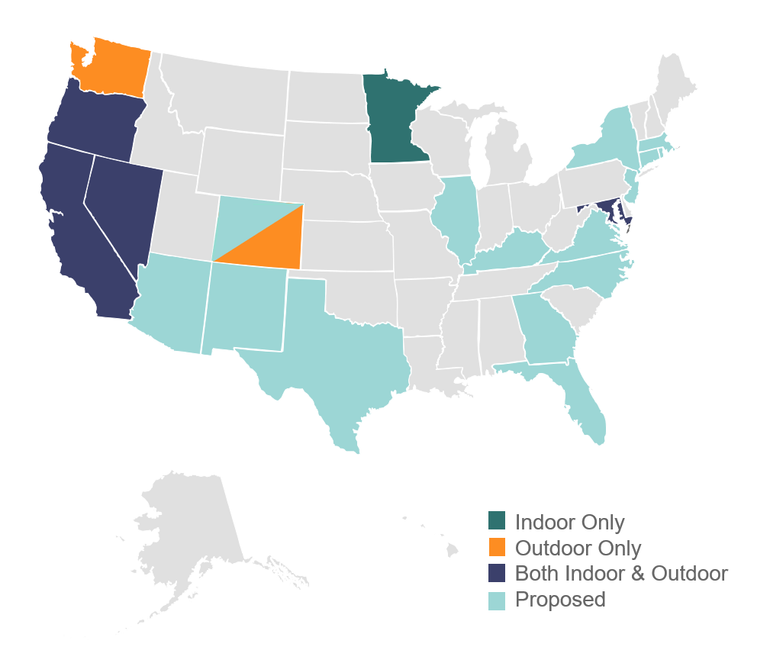Nevada’s sunny and hot summers pose hazards of heat-related illnesses to outdoor workers and non-climate-controlled indoor workers. April 29, 2025 marks a significant milestone for workplace safety in Nevada as the Nevada Occupational Safety and Health Administration (NV OSHA) begins enforcement of its newly adopted heat illness prevention regulation. The regulation, found in Section 618 of the Nevada Administrative Code and approved in November 2024, aims to protect workers from the dangers of heat-related illnesses.
Background
Federal OSHA, which regulates private employers in 27 states, has no heat illness regulations. In the absence of a federal standard, many state plans and state legislatures have issued their own regulations. Starting in the mid-2000s, states began regulating heat illness hazards, focusing mostly on outdoor and agricultural workers. California’s § 3395—Heat Illness Prevention in Outdoor Places of Employment—effective in 2005 as an emergency rule, was one of the first regulatory efforts to protect employees from heat-related illnesses, such as heat cramps, heat exhaustion, and heat stroke. Federal OSHA issued guidance and joined the discussion in 2011, such as through its “Water. Rest. Shade.” Heat illness prevention campaign. Since that time, several other states have implemented regulations addressed at outdoor and indoor heat illness:
- California (§3396) – effective 2024, regulating indoor worksites.
- Colorado – effective 2022, regulating agricultural workers.
- Maryland – effective 2024, regulating indoor and outdoor worksites.
- Minnesota – effective 2014, regulating indoor worksites.
- Oregon – effective 2022, regulating indoor and outdoor worksites.
- Washington – effective 2023, regulating outdoor worksites.

In 2021, federal OSHA initiated a rulemaking to develop an indoor and outdoor heat illness standard. Federal OSHA published draft regulatory language in the Federal Register on August 30, 2024. As of the publication of this Alert, the federal OSHA heat illness prevention rulemaking is still ongoing.
NV OSHA started its own rulemaking in 2023, finding that heat illness poses serious risks to workers in the State, especially those in outdoor and non-climate-controlled indoor environments. According to NV OSHA, the state developed its heat illness regulations in response to a dramatic increase in heat-related complaints, with 467 complaints filed through September 2024, compared to 344 in 2021.
Nevada’s new rules were approved by the Legislative Commission on November 15, 2024. Nevada OSHA issued guidance on January 29, 2025, indicating it would begin enforcement on April 29, 2025.
Key Requirements for Nevada Businesses
The regulation applies to businesses with more than 10 employees in the State of Nevada and includes several critical measures:
1. Job Hazard Analysis (JHA): Employers must prepare a one-time JHA to identify job classifications and tasks where employees are exposed to heat for more than 30 minutes in any 60-minute period, excluding breaks.
a. The JHA should include measures to mitigate or eliminate the identified heat illness hazard, which can be done through engineering controls, administrative controls, and/or personal protective equipment.
b. NV OSHA encourages employers to adopt acclimatization protocols for new or returning workers, but acclimatization is not required.
c. The employer must update its JHA if the job duties materially change or if there is a heat-related incident at the worksite.
2. Written Safety Program: If the JHA identifies heat-related risks, employers must develop a written safety program that includes:
a. Provision of potable water
b. Rest breaks for employees showing signs of heat illness
c. Means of cooling for employees, including air conditioning, increased ventilation, cooling fans, shields for radiant heat, shade, etc.
d. Monitoring of working conditions by a designated person
e. Identification and mitigation of processes generating additional heat or humidity
f. Training for employees on recognizing and minimizing heat illness hazards
g. Emergency procedures for contacting medical services
3. Training: Employers must train employees on how to recognize heat illness hazards and the procedures to minimize risks. Employers should also inform employees about the health risk factors that could exacerbate heat illness, such as certain health conditions, medications, and drug or alcohol use.
4. Emergency Procedures: Designation of an individual responsible for contacting emergency services if an employee exhibits signs of heat illness.
Exemptions
The regulation does not apply to employers with 10 or fewer employees in the State unless the employer is engaged in the manufacture of explosives. The regulation also does not apply to employees working in climate-controlled environments, including vehicles with functioning air conditioning. However, if the climate control system fails, employers must make a good faith effort to restore it as soon as practicable.
Collective Bargaining Agreements
Employers can exceed the requirements of the regulation on their own or through collective bargaining agreements. Collective bargaining agreements cannot waive or reduce the requirements of the regulation.
Other States Propose Regulations
While the 2024-2025 legislative session has provided more than a dozen proposed heat illness-related laws and regulations that employers should keep an eye on, many of them have stalled-out or failed to meet internal legislative deadlines. New laws or regulations have been proposed in:
- Arizona (stalled)
- Colorado (failed)
- Connecticut
- Florida (stalled)
- Georgia (stalled)
- Illinois
- Kentucky (stalled)
- Massachusetts (2 proposals)
- North Carolina (stalled)
- New Jersey (stalled)
- New Mexico
- New York (stalled)
- Rhode Island
- Texas (stalled)
- Virginia (failed)
Even though many of these proposed laws and regulations have stalled or failed, the large number of proposals is a marked change from prior legislative sessions, indicating the willingness of individual states to go above and beyond federal OSHA requirements. Feel free to reach out if you need further details or assistance with specific aspects of the current heat illness prevention landscape.
#Hot #Topic #Nevada #Joins #Ranks #States #Enforcing #Onerous #Heat #Illness #Rules